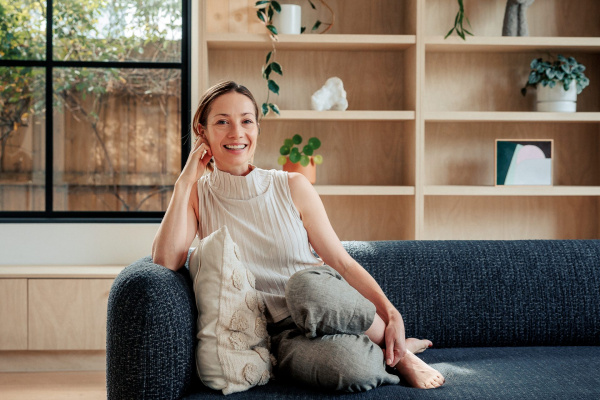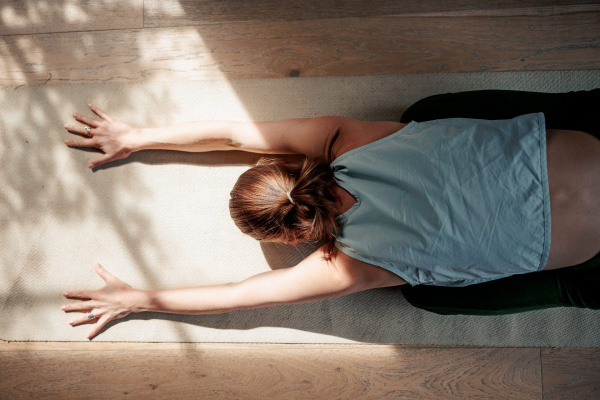
Rest and sleep expert Jo Buick in a yoga pose of rest.
- Culture
Why daily rest is the wellbeing hack we all need
The art of deep rest
Several years ago we learned of a global problem of insufficient sleep, thanks in part to a now infamous movement spearheaded by Ariana Huffington. Sleep was highlighted by experts the world over as an undervalued, critical piece in a wellbeing puzzle, in this fast-paced, always connected, distracted world we live in.
Fast forward to today and not only are we most likely not getting any more (or better quality) sleep, there is another concept to be addressed, and that’s our human need for daily rest.
According to rest expert and the creator of the BeRelaxed rest and sleep course Jo Buick, a good night’s sleep is usually defined as 7 hours to 9 hours of sleep, waking up no more than once, in which we wake up feeling rested.
“Good rest, however, is defined by how settled and relaxed we feel whilst awake. We can be ‘rested’ whilst reading, walking, practicing yoga or engaging in other restorative activities. Rest is a state of mind and a state of being, more than an activity itself,’’ Jo says.
“Through rest education, we learn to settle our nervous systems, soothe our bodies, and allow ourselves to be present to whatever is emerging in the moment.”

Jo Buick says daily rest isn’t scrolling or streaming, it’s walks in nature, reading a book, meditating and yoga
What exactly is rest?
“Rest can be active or passive – ultimately what matters is the state of our nervous systems, not the activity that we are engaged in,’’ Jo says.
“Rest, therefore, can look like many things; a conscious breath, a momentary pause in an activity, a long bath, a slow walk, listening to a favourite song, or mindful drawing. Rest can ultimately be any activity that soothes, calms, and regulates our nervous systems.”
Rest, according to Jo, should not be confused with the escapism of scrolling or streaming.
What are the benefits of rest?
“Rest and relaxation practices are important because, when practiced effectively, they can lower your heart rate, blood pressure and oxygen consumption, whilst also alleviating a range of associated symptoms, including hypertension, arthritis, insomnia, depression, anxiety and even aging,’’ Jo says.
“Clinical studies of rest and relaxation practices indicate that when people practice a gentle, guided reclined meditation, within 10-20 minutes the Relaxation Response is activated leading to genomic activity changes, specifically anti-oxidation and anti-inflammatory changes that counteract the effects of stress on the body.”
Is reducing stress therefore the goal of getting good rest?
“Ultimately, if we want to experience less stress in our lives, we need to practice slowing down and resting more. However, it’s important to mention that to truly reduce the levels of stress that people experience, we need to change our cultural obsession with pace and productivity,’’ Jo says.
“The role of ‘rest’ is to challenge our cultural habituation around productivity, pace, hustle culture and burnout. Ideally, if we practice more rest and get better sleep, we can imagine more nourishing, creative and connected ways to move through the world. This doesn’t mean that we’ll produce more, but it might mean that we produce better.”

Restorative yoga is one of many ways of practicing rest
How to rest
“Pouring a bath or setting the timer to meditate are great ideas, but if your mind is still racing during those activities, they won’t have the intended restful effects. In fact, they might even be stress-inducing if the body isn’t prepared first,’’ Jo says.
“Because our physical bodies hold the energy of stress, we need to use body-focused (somatic) techniques that essentially convince the body to drop its guard and relax into sleep.”
Jo’s checklist of body focussed rest techniques
- Humming
- Shaking
- Sighing
- Belly breaths
- Gentle walking
- Swaying
- Body brushing
- Body tapping
“These techniques aim to communicate a message to the body: ‘you are safe, you can relax’. When we are feeling a little more relaxed, other techniques like journaling, listening to supportive music, lighting incense or candles, or other nourishing activities can also promote sleep,’’ Jo says.
Jo Buick is a rest expert and the creator of the BeRelaxed rest and sleep course available at benefitpocket.com.au.
RELATED: Why daily breathwork is all we need
RELATED: My favourite natural beauty products of all time
